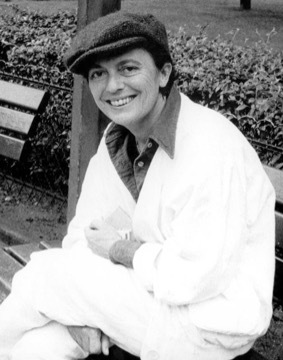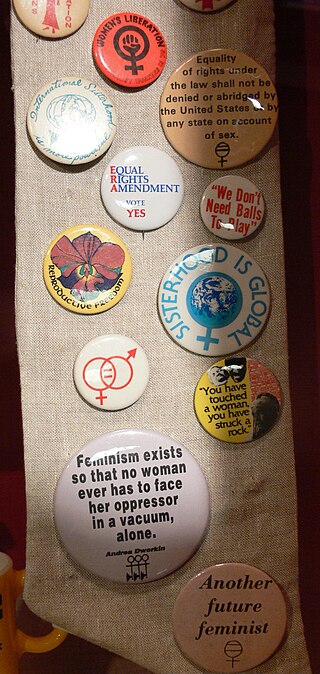Related Research Articles
Feminism is a range of socio-political movements and ideologies that aim to define and establish the political, economic, personal, and social equality of the sexes. Feminism holds the position that modern societies are patriarchal—they prioritize the male point of view—and that women are treated unjustly in these societies. Efforts to change this include fighting against gender stereotypes and improving educational, professional, and interpersonal opportunities and outcomes for women.

Butch and femme are masculine (butch) or feminine (femme) identities in the lesbian subculture that have associated traits, behaviors, styles, self-perception, and so on. This concept has been called a "way to organize sexual relationships and gender and sexual identity". Butch–femme culture is not the sole form of a lesbian dyadic system, as there are many women in butch–butch and femme–femme relationships.

Lesbian feminism is a cultural movement and critical perspective that encourages women to focus their efforts, attentions, relationships, and activities towards their fellow women rather than men, and often advocates lesbianism as the logical result of feminism. Lesbian feminism was most influential in the 1970s and early 1980s, primarily in North America and Western Europe, but began in the late 1960s and arose out of dissatisfaction with the New Left, the Campaign for Homosexual Equality, sexism within the gay liberation movement, and homophobia within popular women's movements at the time. Many of the supporters of Lesbianism were actually women involved in gay liberation who were tired of the sexism and centering of gay men within the community and lesbian women in the mainstream women's movement who were tired of the homophobia involved in it.

Womanism is a feminist movement, primarily championed by Black feminists, originating in the work of African American author Alice Walker in her 1983 book In Search of Our Mothers' Gardens. Walker coined the term "womanist" in the short story "Coming Apart" in 1979. Her initial use of the term evolved to envelop a spectrum of issues and perspectives facing black women and others. Walker defined "womanism" as embracing the courage, audacity, and self-assured demeanor of Black women, alongside their love for other women, themselves, and all of humanity. Since its inception by Walker, womanism has expanded to encompass various domains, giving rise to concepts such as Africana womanism and womanist theology or spirituality.
Feminist theory is the extension of feminism into theoretical, fictional, or philosophical discourse. It aims to understand the nature of gender inequality. It examines women's and men's social roles, experiences, interests, chores, and feminist politics in a variety of fields, such as anthropology and sociology, communication, media studies, psychoanalysis, political theory, home economics, literature, education, and philosophy.

Monique Wittig was a French author, philosopher and feminist theorist who wrote about abolition of the sex-class system and coined the phrase "heterosexual contract". Her groundbreaking work is titled The Straight Mind and Other Essays. She published her first novel, L'Opoponax, in 1964. Her second novel, Les Guérillères (1969), was a landmark in lesbian feminism.
Cultural feminism is a term used to describe a variety of feminism that attempts to revalue and redefine attributes culturally ascribed to femaleness. It is also used to describe theories that commend innate differences between women and men.
Feminist separatism is the theory that feminist opposition to patriarchy can be achieved through women's separation from men. Much of the theorizing is based in lesbian feminism.
Political lesbianism is a phenomenon within feminism, primarily second-wave feminism and radical feminism; it includes, but is not limited to, lesbian separatism. Political lesbianism asserts that sexual orientation is a political and feminist choice, and advocates lesbianism as a positive alternative to heterosexuality for women as part of the struggle against sexism.
Linda Ruth Williams is a professor of Film Studies in the department of Communications, Drama, and Film at the University of Exeter, UK. Her special interests include sexuality and censorship in cinema and literature, women in film, psychoanalytic theory and D. H. Lawrence.
Sheila Jeffreys is a former professor of political science at the University of Melbourne, born in England. A lesbian feminist scholar, she analyses the history and politics of human sexuality.
The Combahee River Collective (CRC) was a Black feminist lesbian socialist organization active in Boston, Massachusetts, from 1974 to 1980. The Collective argued that both the white feminist movement and the Civil Rights Movement were not addressing their particular needs as Black women and more specifically as Black lesbians. Racism was present in the mainstream feminist movement, while Delaney and Manditch-Prottas argue that much of the Civil Rights Movement had a sexist and homophobic reputation. The Collective was a group that met to discuss the intersections of oppression based on race, gender, heteronormativity, and class and argued for the liberation of Black women on all fronts.
Radical lesbianism is a lesbian movement that challenges the status quo of heterosexuality and mainstream feminism. It arose in part because mainstream feminism did not actively include or fight for lesbian rights. The movement was started by lesbian feminist groups in the United States in the 1950s and 1960s. A Canadian movement followed in the 1970s, which added momentum. As it continued to gain popularity, radical lesbianism spread throughout Canada, the United States, and France. The French-based movement, Front des Lesbiennes Radicales, or FLR, organized in 1981 under the name Front des Lesbiennes Radicales. Other movements, such as Radicalesbians, have also stemmed off of the larger radical lesbianism movement. In addition to being associated with social movements, radical lesbianism also offers its own ideology, similar to how feminism functions in both capacities.
Deborah Cameron is a British linguist and feminist who currently holds the Rupert Murdoch Professorship in Language and Communication at Worcester College, Oxford University.

A variety of movements of feminist ideology have developed over the years. They vary in goals, strategies, and affiliations. They often overlap, and some feminists identify themselves with several branches of feminist thought.
Feminist views on sexuality widely vary. Many feminists, particularly radical feminists, are highly critical of what they see as sexual objectification and sexual exploitation in the media and society. Radical feminists are often opposed to the sex industry, including opposition to prostitution and pornography. Other feminists define themselves as sex-positive feminists and believe that a wide variety of expressions of female sexuality can be empowering to women when they are freely chosen. Some feminists support efforts to reform the sex industry to become less sexist, such as the feminist pornography movement.
Onlywomen Press was a feminist press based in London. It was the only feminist press to be founded by out lesbians, Lilian Mohin, Sheila Shulman, and Deborah Hart. It commenced publishing in 1974 and was one of five notably active feminist publishers in the 1990s.

In feminist theory, the male gaze is the act of depicting women and the world in the visual arts and in literature from a masculine, heterosexual perspective that presents and represents women as sexual objects for the pleasure of the heterosexual male viewer. The concept was first articulated by British feminist film theorist Laura Mulvey in her 1975 essay, Visual Pleasure and Narrative Cinema. Mulvey's theory draws on historical precedents, such as the depiction of women in European oil paintings from the Renaissance period, where the female form was often idealized and presented from a voyeuristic male perspective. Art historian John Berger, in his work Ways of Seeing (1972), highlighted how traditional Western art positioned women as subjects of male viewers’ gazes, reinforcing a patriarchal visual narrative.

Sister Outsider: Essays and Speeches is a collection of essential essays and speeches written by Audre Lorde, a writer who focuses on the particulars of her identity: Black woman, lesbian, poet, activist, cancer survivor, mother, and feminist. This collection, now considered a classic volume of Lorde's most influential works of non-fiction prose, has had a groundbreaking impact in the development of contemporary feminist theories. In fifteen essays and speeches dating from 1976 to 1984, Lorde explores the complexities of intersectional identity, while explicitly drawing from her personal experiences of oppression to include sexism, heterosexism, racism, homophobia, classism, and ageism. The book examines a broad range of topics, including love, self-love, war, imperialism, police brutality, coalition building, violence against women, Black feminism, and movements towards equality that recognize and embrace differences as a vehicle for change. With meditative conscious reasoning, Lorde explores her misgivings for the widespread marginalization deeply-rooted in the United States' white patriarchal system, all the while, offering messages of hope. The essays in this landmark collection are extensively taught and have become a widespread area of academic analysis. Lorde's philosophical reasoning that recognizes oppressions as complex and interlocking designates her work as a significant contribution to critical social theory.
The Leeds Revolutionary Feminist Group was a feminist organisation active in the United Kingdom in the 1970s and 1980s. While there were a number of contemporary revolutionary feminist organisations in the UK, the Leeds group was 'internationally significant'. The group is remembered chiefly for two reasons. The first is organising the UK-wide ‘Reclaim the Night’ marches in November 1977. The second is the publication of the pamphlet Political Lesbianism: The Case Against Heterosexuality, which advocated political lesbianism. British activist Sheila Jeffreys was closely involved with the group, while UK feminist Julie Bindel has spoken of the group's influence on her, as have many others.
References
- ↑ Lynnette Turner (2002). "(charles), Helen". In Alison Donnell (ed.). Companion to Contemporary Black British Culture. Routledge. pp. 71–2. ISBN 978-1-134-70025-7.
- ↑ Chris Corrin (2014). Feminist Perspectives on Politics. Routledge. p. 113. ISBN 978-1-317-88025-7.